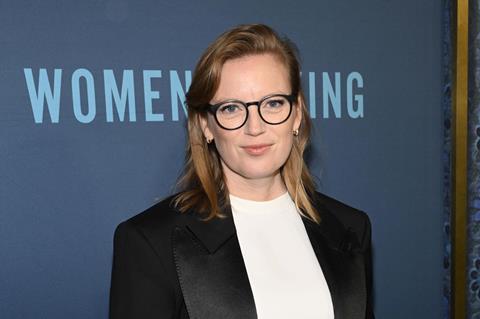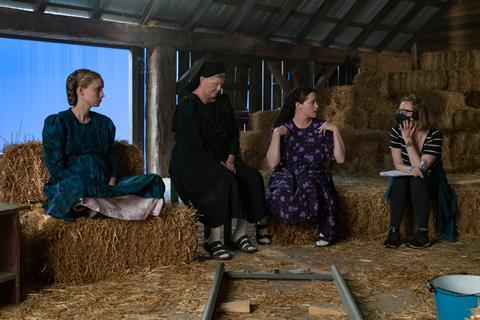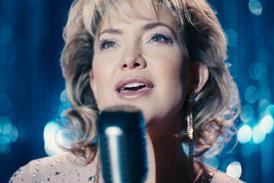In Women Talking, an ultraconservative religious community’s female members must decide how to confront the sexual abuse they are experiencing. Its writer/director Sarah Polley talks to Screen.

Conversation has always been a key part of Sarah Polley’s way of working, initially as an engaged, emotionally articulate actor but particularly now in her career as a writer/director. There is a curiosity and openness to films like Away From Her and the very personal documentary Stories We Tell. Polley’s films have never been self-contained and isolated entities — they are in dialogue with the wider world.
Nowhere is this more evident than in her latest picture, the adaptation of Canadian author Miriam Toews’ 2018 novel Women Talking, starring a formidable ensemble cast that includes Rooney Mara, Jessie Buckley, Claire Foy, Ben Whishaw and Frances McDormand.
As the title suggests, conversation is central to this agile portrait of a group of women — members of an isolated Mennonite community that is rocked by revelations of widespread sexual abuse — as they decide what shape their future will take.
Women talk — and crucially they also listen to each other — in a series of simply staged community meetings in a hayloft, where they must decide if they should stay and continue to accept the abuse, stay and fight the men, or flee. The novel is inspired by real-life events that occurred at the Manitoba Colony, an ultraconservative Mennonite community in the eastern lowlands of Bolivia.
But although the picture unfolds against a very specific backdrop —one that is by its nature removed from broader society — it is also a painfully relevant piece of work with connections that spark far beyond its closeted milieu.
“At the time [Toews’ book] came out, which was not intentional on her part, there was this huge conversation happening around sexual violence, and about guilt and complicity,” says Polley. “I think what Miriam was doing was asking and articulating a lot of questions that I had but didn’t have words for around culpability, community, systems of power, hierarchies, the difference between individual and societal guilt, and how those things are intertwined or connected.”

Roll call
The filmmaker boarded the project after McDormand optioned the book and brought it to Plan B Entertainment. MGM’s Orion Pictures then backed the film with McDormand producing for her own Hear/Say Productions alongside Dede Gardner and Jeremy Kleiner for Plan B. MGM and United Artists Releasing launched the film at Telluride, then segueing to Toronto and New York film festivals, and will release in North America on December 23; Universal Pictures has international rights.
Polley’s adaptation process also incorporated a conversation with her own personal experiences — something that was heightened by the fact she was simultaneously writing this screenplay and working on her autobiographical collection of essays, Run Towards The Danger. Published in March this year and subtitled Confrontations With A Body Of Memory, the book revealed that Polley had herself been a victim of sexual assault when she was 16 years old.
“Inevitably [the two projects] were speaking to each other and echoing each other in ways that were conscious and unconscious,” she says. “There were certain things I was having to come to terms with and articulate for myself that ended up finding their way into the adaptation. Especially the stuff around being disbelieved. When Mejal [the teen character played by Michelle McLeod] says, ‘They made us disbelieve ourselves and that was worse,’ I don’t know that I would’ve had those words without having written my own experience. I think it is such a common experience — and it is, in many cases, the most damaging part of this kind of experience, that sense of not being thought of as credible.”
The film, with its meaty monologues and extended scenes of debate and exchange of ideas, punctuated with moments of unexpected levity, feels a distinctive and original work. “I try very hard when I’m making films, even if I’m watching a lot of stuff, to not be directly referencing things,” says Polley.
There were, however, some works that informed her approach. “I thought a lot about the writing of Marilynne Robinson. [Her] book Gilead was a huge inspiration to me, just in terms of the kind of feeling I wanted to create among people when they were working. Twelve Angry Men is an obvious reference, but it didn’t quite work for this film because what they’re discussing affects someone other than them. But these women are remaking their entire world and everything they talk about has a direct impact on them and on their children’s futures.”
Toews’ input was, Polley says, invaluable. “I always think it’s interesting to ask an author if there’s one thing they want to make sure is not lost in the adaptation, what is it? And her answer was very clear — it was the laughter. That was a helpful thing for me to hear. My natural instinct is to look for moments of humour in the middle of tragedy. To be given the permission to move towards that whenever possible was a great signpost.”
With the screenplay as a framework, Polley was keen to allow her cast the leeway to explore and experiment in any way they felt appropriate, whether through Mara’s pranks with a concealed fart machine or Buckley’s endlessly inventive readings. “I mean, if you had put that group of actors in a room together and just asked them to do whatever they wanted, I think it would’ve been a good film. I cast people I knew I could trust with my life. What I most wanted was to create a kind of environment that flowed on its own — so that I could tell myself every day, ‘Make it easy, get out of the way, see what happens.’”
Preparation was extensive, starting with several one-to-one meetings between Polley and each of her cast members, then “family” meetings, grouping together the women from each clan. A week of remote Zoom rehearsals was followed by a week of in-person sessions. “For a film, it was extensive,” Polley says, “but it did have to function as smoothly as a very well-rehearsed play by the time we got to set, for it to work.”
Covid-19 protocols were in place in Canada for the late-summer 2021 shoot in Toronto and southern Ontario but, Polley says, the impact of the pandemic was not entirely negative. “First of all, we had all been so isolated — so the intimacy these characters have with each other, there was an electricity to that. And what was interesting to me was we saw each other’s faces on Zoom as we were working things out, but then we were masked during rehearsal — which everyone was really not happy about.
“But what was kind of great was that the day of actual photography was the first time they had seen each other’s faces [in the flesh]. So I have this crazy idea right now that I would like to start every production by rehearsing in masks. Because I think that you get all the preparation you need, but you don’t destroy any of the freshness.”
One of the most distinctive aspects of the film is the use of — or lack of — colour. The story unfolds within a severe, shadowy frame from which almost all the colour has been drained.
“I wanted it to feel like a world that’s already passed,” says Polley. “So there’s almost a nostalgia to it and certainly a bleakness. Just by the very nature of them having this conversation, they’ve already changed the world they live in.
“So they’re already looking back at it. It was very clear to me that it could not look realistic. Otherwise, the story itself doesn’t hold up.
“It’s a fable,” Polley continues. “It’s not meant to be a docudrama. I didn’t want to shy away from that and I didn’t mind being heavy-handed about it. I thought that was weirdly important.”
























No comments yet